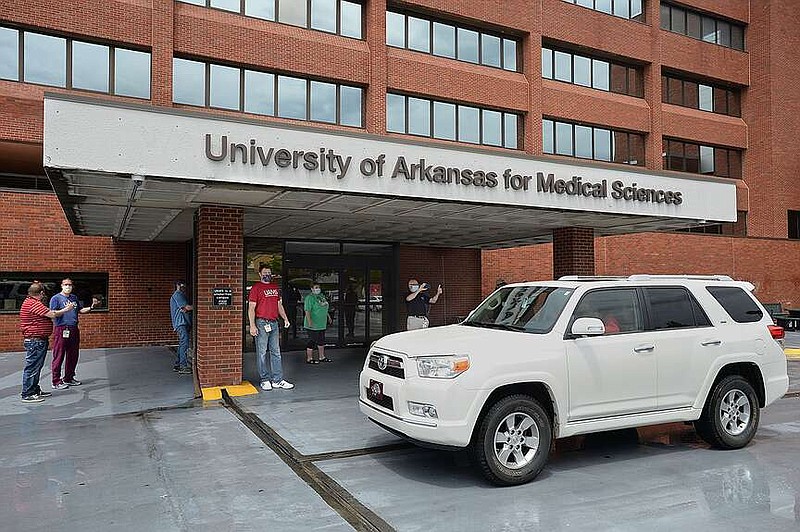The University of Arkansas for Medical Sciences has passed initial review by the American Nurses Credentialing Center in its quest for Magnet status and could gain the coveted designation early next year, said Rebeka Thacker, director of the UAMS Center for Nursing Excellence.
UAMS is "the best place to work as a nurse and the best place for care," Thacker, who has been with UAMS for more than two decades, told the University of Arkansas System board of trustees during a meeting Tuesday at UAMS.
Though "excellence is a constant pursuit," Magnet status is a framework that supports excellence in nursing practice, she said.
Magnet is the highest distinction of nursing excellence, according to UAMS. It signifies that an organization "has taken every effort to promote the empowerment, engagement, and development of nurses, which leads to high quality outcomes, improved patient satisfaction and highly satisfied employees."
UAMS spent two years collecting data before submitting its documentation to the ANCC at the end of January and expects a site visit in July or August, Thacker said. A small group of Magnet Ambassadors will guide magnet appraisers through UAMS on the site visit, and Magnet Champions -- one or two registered nurses -- will receive magnet appraisers at the clinic.
The mission of UAMS nursing is to deliver safe, high quality, patient-family centered care, and nursing programs with Magnet status experience less burnout and turnover among nurses, along with higher job satisfaction, she said. Patients also have lower mortality rates and fewer falls and infections.
Collaboration with all members in the health care circle, from physicians and pharmacy technicians to respiratory and physical therapists, is paramount, she said. The university has recently innovated in several areas, including care for sexual assault victims, covid testing and triage, and stroke care, all of which is additional evidence for Magnet status.
Sexual Assault Nurse Examiner, or SANE programs "train registered nurses to provide comprehensive health care to survivors of sexual assault," according to UAMS. Through the use of innovative video conferencing technology, TeleSANE provides clinicians with ongoing, real-time access to the knowledge and support they need to provide care for patients who have experienced a sexual assault.
SANE practitioners help registered nurses with support and education, according to UAMS. Better medical forensic photography, user-friendly equipment, and improved documentation practices are all benefits of TeleSANE.
Since TeleSANE began in 2021, the "public service" has made an impact every day, said Sherrie Searcy-Lyle, TeleSANE director. Nationally, only two in seven individuals believed to be victims of sexual assault actually report it, but nearly nine in 10 of those who had access to a SANE-trained care specialist reported their assault.
UAMS has 26 SANE hospitals/crisis centers open already, with eight more in the pipeline, which will give a third of the state's 75 counties ready access, she said. However, all Arkansans have SANE access remotely through 24/7 the TeleSANE call center.
Those treated with the SANE model are less likely to be revictimized, and human trafficking screening is also part of the program, she said. In addition, 100% of patients surveyed said they felt cared for and respected by the nurses and would encourage others to use TeleSANE, "my favorite stat."
Despite the challenges of the pandemic, UAMS provided more than 174,000 covid tests with drive-through care during the peak of the pandemic in a safe, efficient, and effective manner, said Deb Hutts, nursing director in perioperative -- care before and after surgery -- services. Furthermore, "[We] created an environment for our nurses to feel safe at work."
Subject matter experts became shift leaders, and daily huddles were especially valuable, she said. "Things changed so quickly, [and it was] a time to allow feedback."
Every day in Arkansas, 30 people have a stroke, but 13 of them face significant travel to receive care due to the rural nature of the state, which is deleterious to positive outcomes, said nurse Kenneth Lewis. However, the state's first comprehensive stroke center, the UAMS Health Stroke Center, allows more stroke patients faster access to elite care.
In Jan. 2021, the average "door-to-door" treatment time was 263 minutes, but as UAMS implemented its comprehensive stroke program, that time decreased to 108 minutes in May 2021, he said. "UAMS has the best stroke program I've ever seen."
The strides made -- and accomplishments of -- UAMS nurses in recent years as they progress toward Magnet status are "inspirational and make us very proud," said trustee Kevin Crass.
